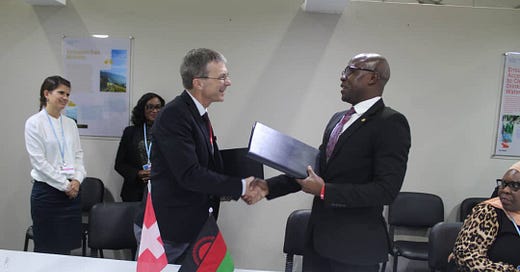Malawi, Switzerland sign carbon credits pact
The agreement is consistent with Article 6 of the Paris Agreement (2015) PA, which specifies a different mechanism for bilateral carbon trading arrangements between countries.
Sharm El Sheik, Egypt: Malawi and Switzerland have signed a bilateral carbon trading agreement to facilitate the implementation of projects that will contribute to the reduction of greenhouse gases (GHG) that cause climate change.
The agreement is consistent with Article 6 of the Paris Agreement (2015) PA, which specifies a different mechanism for bilateral carbon trading arrangements between countries.
Carbon trading is an agreement in which countries that fail to reduce carbon emissions in the atmosphere as required by the UN Framework Convention on Climate Change are asked to contribute to reducing carbon emissions in the atmosphere by financing climate change mitigation projects in a country that is performing well in mitigation.
The 34-year framework will facilitate initiatives such as the establishment of biogas plants, the acceleration of solar energy access, tree planting, and the scaling up of modern cooking methods, all of which will contribute to the reduction of deforestation.
Minister of Natural Resources and Climate Change Eisenhower Mkaka expressed optimism at a CoP27 fireside event in Sharm El-Sheikh, Egypt, that the upcoming projects will not only facilitate the creation of green jobs and entrepreneurial opportunities but will also accelerate Malawi's implementation of laid-out national mitigation targets, also known as Nationally Determined Contributions (NDCs).
“The agreement means we will have the government or companies (from Switzerland) that would come to Malawi undertake projects that will reduce the presence of carbon in the atmosphere. There will be money exchanging hands specifically for the implementation of projects,” Mkaka said.
Mkaka also stated that he was aware of some unscrupulous entities that are exploiting countries and taking advantage of their limited capacity, a novel concept.
According to Mkaka, the involvement of two countries in this arrangement will ensure that all parties are protected and can resolve issues mutually.
“As a country, we will make sure that we are wide awake so that no one takes advantage of us. We are also going to strengthen our regulations, improve our data management and build the capacity of our staff,” he said.
Mkaka said the agreement provides a broader framework and which the two governments will do the trading but specific details of the deal are not available as the technical teams from the two sides need to work on them in liaison.
“It is my expectation that under this framework, we shall be able to have meaningful benefits from carbon trading through large and impactful projects in line with the conditional actions that are outlined in our NDCs. It is also my sincere hope that we will put in place mechanisms for monitoring, reporting, and verification of the transactions to ensure that they are in line with the article 6.2 decision from the Conference of the Parties,” he said.
According to Swiss Environment Ambassador Franz Xaver Perrez, this is an important step and a clear demonstration of how the Global North and Global South can collaborate to address the existential threat of climate change.
He added that Malawi will benefit from Ghana's and Senegal's experiences in supporting the implementation of similar projects.
“The project will benefit both of us. Malawi is helping us reduce carbon from the atmosphere which we could not have done on our own. At the same time this is an investment into Malawi towards a sustainable future as it will help Malawi implement projects it would not have been able to implement without our help,” Perrez said.





